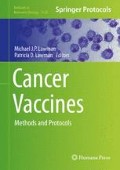Abstract
The use of bacterial vectors, which offer ease of production and efficiency, has become an important mechanism for the delivery of protein antigens to antigen-presenting cells (APCs) in vivo. Proof of concept studies has been carried out utilizing different bacteria in various cancer models with some in clinical trials. Here we described the way to prepare Pseudomonas aeruginosa (P. aeruginosa) vaccines based on a virulence-attenuated strain to test the efficacy of different fragments of a well-known tumor antigen. This protocol could be applied to efficacy studies in murine models of human cancers.
Access this chapter
Tax calculation will be finalised at checkout
Purchases are for personal use only
References
Carleton HA (2010) Pathogenic bacteria as vaccine vectors: teaching old bugs new tricks. Yale J Biol Med 83(4):217–222
Shahabi V et al (2010) Live, attenuated strains of Listeria and Salmonella as vaccine vectors in cancer treatment. Bioeng Bugs 1(4): 235–239
Singh R, Wallecha A (2011) Cancer immunotherapy using recombinant Listeria monocytogenes: transition from bench to clinic. Hum Vaccin 7(5):497–505
Le Gouellec A et al (2012) Bacterial vectors for active immunotherapy reach clinical and industrial stages. Hum Vaccin Immunother 8(10): 1454–1458
Deane JE et al (2010) Timing is everything: the regulation of type III secretion. Cell Mol Life Sci 67(7):1065–1075
Epaulard O et al (2008) Optimization of a type III secretion system-based Pseudomonas aeruginosa live vector for antigen delivery. Clin Vaccine Immunol 15(2):308–313
Derouazi M et al (2008) High-yield production of secreted active proteins by the Pseudomonas aeruginosa type III secretion system. Appl Environ Microbiol 74(11):3601–3604
Derouazi M et al (2010) Optimal epitope composition after antigen screening using a live bacterial delivery vector application to TRP-2. Bioeng Bugs 1(1):51–60
Author information
Authors and Affiliations
Editor information
Editors and Affiliations
Rights and permissions
Copyright information
© 2014 Springer Science+Business Media New York
About this protocol
Cite this protocol
Wang, Y., Toussaint, B., Le Gouëllec, A. (2014). Bacterial Vectors for the Delivery of Tumor Antigens. In: Lawman, M., Lawman, P. (eds) Cancer Vaccines. Methods in Molecular Biology, vol 1139. Humana Press, New York, NY. https://doi.org/10.1007/978-1-4939-0345-0_33
Download citation
DOI: https://doi.org/10.1007/978-1-4939-0345-0_33
Published:
Publisher Name: Humana Press, New York, NY
Print ISBN: 978-1-4939-0344-3
Online ISBN: 978-1-4939-0345-0
eBook Packages: Springer Protocols

